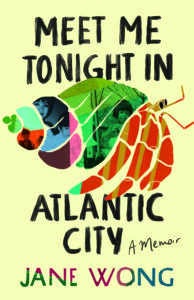Oftentimes, a reader asks what it’s like to publish a memoir with family members in it. How do you seek permission? What do you do when someone in your family protests your storytelling? Do you write it anyway?
In this transmission, the radio delivers the questions as something else: Where is your father? Did he write you into being?
What a fog, obscuring the tree line. What does my father know about me? He knows I am a writer. Knows my birthday is sometime in the fall, or maybe early winter. The death of something in the ground. A time for wilting wind and rats finding their way inside. He knows I don’t like to be tickled, will scratch at his flashlight eyes and cry and laugh, culling blood, if he tries. Knows I have or haven’t forgiven him, depending on which mountain of sadness visits him that day. I’d like to say he knows I am his daughter. But when I visited him after sixteen years of estrangement, after I published my memoir, after he had his stroke, he thought I was my mother. I was the age my mother was when they divorced. He was as surprised as I was. Time can stop, turns out. Would he be wrong?
During that visit at the rehabilitation center, he couldn’t move his mouth. He couldn’t move his entire left side. If I had become a mechanic instead of a writer, I would have brought my toolkit to get the gears going right. I would have examined each hinge, each stuck lever. One thing was clear: the rust was everywhere upon him. I could barely recognize him. He was such an old man. When I touched my father’s shoulder, I felt him flinch internally like I was a stranger, a daughter, or a wife. He did feel something.
In her Atlantic City \ 60 Detected Rings (1991-2021) series, artist Rose Salane collected lost rings from Atlantic City, bringing them to an intuitive reader to find out more about their owners. There’s one wide-banded ring that reads: “This belonged to a man who was difficult to get to know. Deep down he had soft spots for certain people. But overall, he was a very tough person who lived alongside difficulty…” There is no date for this ring. Could this have been my father’s wedding ring? Lost on the cigarette studded gambling floor? I reached out to touch the ring, but my finger hit plexiglass and the attendant at Mass MoCA came over to not-so-gently tell me to step back. And I did step back, back into a place where I was a single cell swimming in my mother’s belly, preparing to divide my rooms. The museum was closing in 30 minutes. Wait, I wanted to say, I’m just a cell.
In this transmission, the radio delivers the questions as something else: Where is your father? Did he write you into being?
My father is living in Jersey still. Or rather, he is alive in Jersey. My father wrote half of me into being, I suppose. My mother wrote the other half and that half has now grafted across every inch of me like high quality ivy. But I still have his flashlight eyes. I guess the eyes are unavoidable. Windows? Wilting wind? My friends used to joke that I have resting sad face. They called me Saddest Jane. I wish I could line our eyeballs back to back, to see if they are the same size. Wow, I’d say to him, a perfect match. Four saddest moons, orbiting each other.
I guess I wrote the book anyway. If I’m being honest, I wanted my father to protest it. I wanted him to beg me to stop the sentences from spinning forth. Like, stop the presses! Be angry! I’d challenge him. I know he has anger in him. I’ve seen it stun my mother silent. I’ve seen it slither into the cracks in the wall and freeze rats to death. Yell at me and accuse me of making you look bad. Leave us. Leave us again and again! Loop of our lives, recursive comfort. Without permission, without protest, all I have in transmission: I don’t care or It’s too late or I just don’t know you. What do you do when you want someone to feel something?
I’m tapping on plexiglass, trying to touch objects that have no meaning to me. I’m rummaging through his trash at the rehabilitation center, his tissues full of bile and regret. So much mucus. I told myself I wouldn’t write nonfiction again. It’s just too hard. Lugging so much breath back and things I want to say that I won’t. Like: my birthday is in October.
_____________________________________

Meet Me Tonight in Atlantic City by Jane Wong is available now via Tin House.

